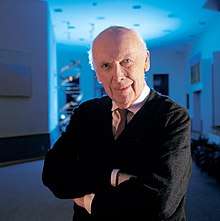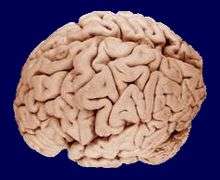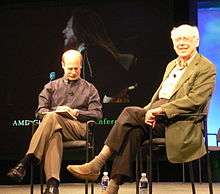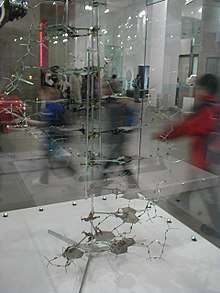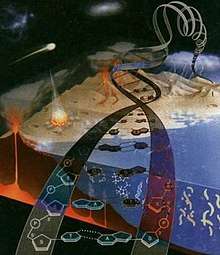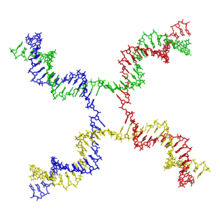James Dewey Watson (born 6 April 1928) is an American scientist, most known as one of the four discoverers of the structure of the DNA molecule.
Quotes

No one really wants to admit I exist.
1990s
- The brain is the last and grandest biological frontier, the most complex thing we have yet discovered in our universe. It contains hundreds of billions of cells interlinked through trillions of connections. The brain boggles the mind.
- Foreword for Discovering the Brain (1992) by Sandra Ackerman, p. iii; often paraphrased: "The brain is the most complex thing we have yet discovered in our universe."
- There is only one science, physics: everything else is social work.
- As quoted in Lifelines (1997) by Steven Rose
- When anti-DNA doomsday scenarios failed to materialize, even the modestly restrictive governmental regulations began to wither away. In retrospect, recombinant-DNA may rank as the safest revolutionary technology ever developed. To my knowledge, not one fatality, much less illness, has been caused by a genetically manipulated organism.
The moral I draw from this painful episode is this: Never postpone experiments that have clearly defined future benefits for fear of dangers that can't be quantified. Though it may sound at first uncaring, we can react rationally only to real (as opposed to hypothetical) risks.
- Moving forward will not be for the faint of heart. But if the next century witnesses failure, let it be because our science is not yet up to the job, not because we don't have the courage to make less random the sometimes most unfair courses of human evolution.
- "All for the Good: Why genetic engineering must soldier on" TIME magazine, Vol. 153, No. 1 (11 January 1999)
2000s
- Whenever you interview fat people, you feel bad, because you know you're not going to hire them.
- No one may have the guts to say this, but if we could make better human beings by knowing how to add genes, why shouldn't we?
- "Risky Genetic Fantasies" in The Los Angeles Times (29 July 2001), p. M4
- If we don't play God, who will?
- The Lives to Come: The Genetic Revolution and Human Possibilities (1996)
- I just can’t sit while people are saying nonsense in a meeting without saying it’s nonsense.
- Scientific American Vol. 288, Issue 4 (2003), p. 54
- People say it would be terrible if we made all girls pretty. I think it would be great.
- Never be the brightest person in the room. … We're all imperfect.
- Science Ph.D. students have effectively become serfs. And who would become a serf when you can work for Goldman Sachs and get paid $300,000 a year to become a serf? Why drive a Chevy when you can drive a BMW — and now you're condemned to driving a car from Malaysia or something. Life should be fun.
2010s
- No one really wants to admit I exist.
- On reactions to statements indicating differences of intelligence or perception levels in various human populations have genetic factors, widely perceived as racist, as quoted in "James Watson to sell Nobel Prize medal" by David Crow in Financial Times (28 November 2014)
- Not at all. I would like for them to have changed, that there be new knowledge that says that your nurture is much more important than nature. But I haven’t seen any knowledge. And there’s a difference on the average between blacks and whites on I.Q. tests. I would say the difference is, it’s genetic.
The Double Helix (1968)

One could not be a successful scientist without realizing that, in contrast to the popular conception supported by newspapers and mothers of scientists, a goodly number of scientists are not only narrow-minded and dull, but also just stupid.
- The Double Helix: A Personal Account of the Discovery of the Structure of DNA (1968)
- One could not be a successful scientist without realizing that, in contrast to the popular conception supported by newspapers and mothers of scientists, a goodly number of scientists are not only narrow-minded and dull, but also just stupid.
- I suspect that in the beginning Maurice hoped that Rosy would calm down. Yet mere inspection suggested that she would not easily bend. By choice she did not emphasize her feminine qualities. Though her features were strong, she was not unattractive and might have been quite stunning had she taken even a mild interest in clothes. This she did not. There was never lipstick to contrast with her straight black hair, while at the age of thirty-one her dresses showed all the imagination of English blue-stocking adolescents. So it was quite easy to imagine her the product of an unsatisfied mother who unduly stressed the desirability of professional careers that could save bright girls from marriages to dull men. But this was not the case. Her dedicated austere life could not be thus explained — she was the daughter of a solidly comfortable, erudite banking family.
Clearly Rosy had to go or be put in her place. The former was obviously preferable because, given her belligerent moods, it would be very difficult for Maurice to maintain a dominant position that would allow him to think unhindered about DNA. Not that at times he'd didn't see some reason for her complaints — King's had two combination rooms, one for men, the other for women, certainly a thing of the past. But he was not responsible, and it was no pleasure to bear the cross for the added barb that the women's combination room remained dingily pokey whereas money had been spent to make life agreeable for him and his friends when they had their morning coffee.
Unfortunately, Maurice could not see any decent way to give Rosy the boot. To start with, she had been given to think that she had a position for several years. Also there was no denying that she had a good brain. If she could keep her emotions under control, there was a good chance she could really help him. But merely wishing for relations to improve was taking something of a gamble, for Cal Tech's fabulous chemist Linus Pauling was not subject to the confines of British fair play. Sooner or later Linus, who had just turned fifty, was bound to try for the most important of all scientific prizes. There was no doubt he was interested. … The thought could not be avoided that the best home for a feminist was in another person's lab.- Description of Rosalind Franklin, whose data and research were actually key factors in determining the structure of DNA, but who died in 1958 of ovarian cancer, before the importance of her work could be widely recognized and acknowledged. In response to these remarks her mother stated "I would rather she were forgotten than remembered in this way." As quoted in "Rosalind Franklin" at Strange Science : The Rocky Road to Modern Paleontology and Biology by Michon Scott
Children from the Laboratory (May 1973), An Interview in Prism Magazine
See Prism, vol. 1, no. 2, p. 13. Prism was the Socio economic Magazine of the American Medical Association. Text at CSHL Archives Repository.
- Watson: But legalities aside, I think we must reevaluate our basic assumptions about the meaning of life. Perhaps, as my former colleague Francis Crick suggested, no one should be thought alive until about three days after birth.
- Prism: But how would society react to such a proposal?
- Watson: Our society just hasn't faced up to this problem. In a primitive society, if you saw that a baby was deformed, you would abandon it on a hillside. Today this isn't permissible, and with our medicine getting better and better in the sense of being able to keep sick people alive longer, we are going to produce more people living wretched lives. I don't know how you get a society to change on such a basic issue; infanticide isn't regarded lightly by anyone. Fortunately, now through such techniques as amniocentesis, parents can often learn in advance whether their child will be normal and healthy or hopelessly deformed. They then can choose either to have the child or opt for a therapeutic abortion. But the cruel fact remains that because of the present limits of such detection methods, most birth defects are not discovered until birth. If the child were not declared alive until three days after birth, then all parents could be allowed the choice that only a few are given under the present system. The doctor could allow the child to die if the parents so chose and save a lot of misery and suffering. I believe this view is the only rational, compassionate attitude to have.
Succeeding in Science: Some Rules of Thumb (1993)
- "Succeeding in Science: Some Rules of Thumb" in Science Vol. 261 (24 September 1993), pp. 1812-1813
- To have success in science, you need some luck.
But to succeed in science, you need a lot more than luck. And it's not enough to be smart — lots of people are very bright and get nowhere in life. In my view, you have to combine intelligence with a willingness not to follow conventions when they block your path forward.
- To succeed in science, you have to avoid dumb people (here I was still following Luria's example). Now that might sound inexcusably flip, but the fact is that you must always turn to people who are brighter than yourself.
- To make a huge success, a scientist must be prepared to get into deep trouble. Sometime or another, someone will tell you that you are not ready to do something. … If you are going to make a big jump in science, you will very likely be unqualified to succeed by definition. The truth, however, won't save you from criticism. Your very willingness to take on a very big goal will offend some people who will think that you are too big for your britches and crazy to boot.
- Be sure you have someone up your sleeve who will save you when you find yourself in deep s—.
- Never do anything that bores you. My experience in science is that someone is always telling to do something that leaves you flat. Bad idea. I'm not good enough to do something I dislike. In fact, I find it hard enough to do something that I like. … Constantly exposing your ideas to informed criticism is very important, and I would venture to say that one reason both of our chief competitors failed to reach the Double Helix before us was that each was effectively very isolated.
What I've Learned: James Watson (2007)
- New ideas require new facts.
You explain things by way of ideas. Why do we have a government that is run by rich trash? Because they've used their money to buy the presidency. Bush is a tool for the people who don't want an inheritance tax.
- For all my life, America was the place to be. And we somehow continue to be the place where there are real opportunities to change the world for the better.
I'm basically a libertarian. I don't want to restrict anyone from doing anything unless it's going to harm me. I don't want to pass a law stopping someone from smoking. It's just too dangerous. You lose the concept of a free society. Since we are genetically so diverse and our brains are so different, we're going to have different aspirations. The things that will satisfy me won't satisfy you. On the other hand, if global warming is in any way preventable and it's likely to come, not doing something would be irresponsible to the future of our society.
- If you can't be criticized, that's very dangerous.
- I turned against the left wing because they don't like genetics, because genetics implies that sometimes in life we fail because we have bad genes. They want all failure in life to be due to the evil system.
- If you could make people with ten-point-higher IQs, we'd probably have fewer wars.
- I've seen no evidence of a god, so I'm not going to think about one.
Being raised nonreligious made you free. You could look at the evidence. Whether being nonreligious or a Democrat was more important, I can't tell you.
- Do things as soon as you can. If a decision needs to be made, make it. It gives you more time to change your mind.
To question genetic intelligence is not racism (2007)

To those who have drawn the inference from my words that Africa, as a continent, is somehow genetically inferior, I can only apologise unreservedly. That is not what I meant. More importantly from my point of view, there is no scientific basis for such a belief.

We do not yet adequately understand the way in which the different environments in the world have selected over time the genes which determine our capacity to do different things.
- "James Watson: To question genetic intelligence is not racism", in The Independent (19 October 2007)
- Science is no stranger to controversy. The pursuit of discovery, of knowledge, is often uncomfortable and disconcerting. I have never been one to shy away from stating what I believe to be the truth, however difficult it might prove to be. This has, at times, got me in hot water.
Rarely more so than right now, where I find myself at the centre of a storm of criticism. I can understand much of this reaction. For if I said what I was quoted as saying, then I can only admit that I am bewildered by it. To those who have drawn the inference from my words that Africa, as a continent, is somehow genetically inferior, I can only apologise unreservedly. That is not what I meant. More importantly from my point of view, there is no scientific basis for such a belief.
I have always fiercely defended the position that we should base our view of the world on the state of our knowledge, on fact, and not on what we would like it to be. This is why genetics is so important. For it will lead us to answers to many of the big and difficult questions that have troubled people for hundreds, if not thousands, of years.
But those answers may not be easy, for, as I know all too well, genetics can be cruel. My own son may be one of its victims. Warm and perceptive at the age of 37, Rufus cannot lead an independent life because of schizophrenia, lacking the ability to engage in day-to-day activities.
- Since 1978, when a pail of water was dumped over my Harvard friend E. O. Wilson for saying that genes influence human behaviour, the assault against human behavioural genetics by wishful thinking has remained vigorous.
But irrationality must soon recede. It will soon be possible to read individual genetic messages at costs which will not bankrupt our health systems. In so doing, I hope we see whether changes in DNA sequence, not environmental influences, result in behaviour differences. Finally, we should be able to establish the relative importance of nature as opposed to nurture.
- The thought that some people are innately wicked disturbs me. But science is not here to make us feel good. It is to answer questions in the service of knowledge and greater understanding.
In finding out the extent to which genes influence moral behaviour, we shall also be able to understand how genes influence intellectual capacities.
- Right now, at my institute in the US we are working on gene-caused failures in brain development that frequently lead to autism and schizophrenia. We may also find that differences in these respective brain development genes also lead to differences in our abilities to carry out different mental tasks.
In some cases, how these genes function may help us to understand variations in IQ, or why some people excel at poetry but are terrible at mathematics. All too often people with high mathematical abilities have autistic traits. The same gene that gives some people such great mathematical abilities may also lead to autistic behaviour. This is why, in studying autism and schizophrenia, we believe that we shall come very close to a better understanding of intelligence and, therefore, of the differences in intelligence.
- We do not yet adequately understand the way in which the different environments in the world have selected over time the genes which determine our capacity to do different things. The overwhelming desire of society today is to assume that equal powers of reason are a universal heritage of humanity. It may well be. But simply wanting this to be the case is not enough. This is not science.
To question this is not to give in to racism. This is not a discussion about superiority or inferiority, it is about seeking to understand differences, about why some of us are great musicians and others great engineers. It is very likely that at least some 10 to 15 years will pass before we get an adequate understanding for the relative importance of nature versus nurture in the achievement of important human objectives. Until then, we as scientists, wherever we wish to place ourselves in this great debate, should take care in claiming what are unarguable truths without the support of evidence.
Quotes about Watson

There is no firm reason to anticipate that the intellectual capacities of peoples geographically separated in their evolution should prove to have evolved identically.
- There is in the first place its scientific interest. The discovery of the structure by Crick and Watson, with all its biological implications, has been one of the major scientific events of this century. The number of researches which it has inspired is amazing; it has caused an explosion in biochemistry which has transformed the science. I have been amongst those who have pressed the author to write his recollections while they are still fresh in his mind, knowing how important they would be as a contribution to the history of science. The result has exceeded expectation. The latter chapters, in which the birth of the new idea is described so vividly, are drama of the highest order; the tension mounts and mounts towards the final climax. I do not know of any other instance where one is able to share so intimately in the researcher's struggles and doubts and final triumph.
Then again, the story is a poignant example of a dilemma which may confront an investigator. He knows that a colleague has been working for years on a problem and has accumulated a mass of hard-won evidence, which has not yet been published because it is anticipated that success is just around the comer. He has seen this evidence and has good reason to believe that a method of attack which he can envisage, perhaps merely a new point of view, will lead straight to the solution. An offer of collaboration at such a stage might well be regarded as a trespass. Should he go ahead on his own It is not easy to be sure whether the crucial new idea is really one's own or has been unconsciously assimilated in talks with others. The realization of this difficulty has led to the establishment of a some what vague code amongst scientists which recognizes a claim in a line of research staked out by a colleague up to a certain point. When competition comes from more than one quarter, there is no need to hold back. This dilemma comes out clearly in the DNA story. It is a source of deep satisfaction to all intimately concerned that, in the award of the Nobel Prize in 1962, due recognition was given to the long, patient investigation by Wilkins at King's College (London) as well as to the brilliant and rapid final solution by Crick and Watson at Cambridge.
Finally, there is the human interest of the story the impression made by Europe and by England in particular upon a young man from the States. He writes with a Pepys like frankness. Those who figure in the book must read it in a very forgiving spirit. One must remember that his book is not a history, but an autobiographical contribution to the history which will some day be written. As the author himself says, the book is a record of impressions rather than historical facts. The issues were often more complex, and the motives of those who had to deal with them were less tortuous, than he realized at the time. On the other hand, one must admit that his intuitive understanding of human frailty often strikes home.- Lawrence Bragg, Foreword to The Double Helix (1968) by James D. Watson
- He says that he is “inherently gloomy about the prospect of Africa” because “all our social policies are based on the fact that their intelligence is the same as ours – whereas all the testing says not really”, and I know that this “hot potato” is going to be difficult to address. His hope is that everyone is equal, but he counters that “people who have to deal with black employees find this not true”. He says that you should not discriminate on the basis of colour, because “there are many people of colour who are very talented, but don’t promote them when they haven’t succeeded at the lower level”. He writes that “there is no firm reason to anticipate that the intellectual capacities of peoples geographically separated in their evolution should prove to have evolved identically. Our wanting to reserve equal powers of reason as some universal heritage of humanity will not be enough to make it so”.
- C. Hunt-Grubbe, in a summary of his statements which caused wide criticism of Watson, in "The elementary DNA of dear Dr. Watson", in Times Online (14 October 2007)
- Consistently rated as one of the greatest books written about science in the past century, it has been hailed as a work that combines the plot line of a racy novel with deep insights about the nature of modern research.
But James Watson, author of The Double Helix, has revealed that his masterpiece came close to being suppressed. In an exclusive interview with the Observer, he admitted last week that his account of the discovery of the structure of DNA, when shown to friends and colleagues in the late 60s, triggered such hostility and outrage it seemed fated never to appear in print. … Many publishers were frightened off by threats of legal action from the manuscript's critics. Watson's depictions of several scientists were deeply unflattering and the book's secondary plot, which focuses on Watson's pursuit of young women – or "popsies" as he called them – around Cambridge, was considered irrelevant and patronising. Harvard University Press, having accepted Watson's manuscript for publication, came under pressure from the university's senior administrators and dropped the book.
It took the intervention of Lady Alice Bragg, the wife of Watson's former boss, Sir [William] Lawrence Bragg, to save The Double Helix, Watson has revealed.
External links
- James D. Watson Collection at the Cold Spring Harbor Laboratory Library
- MSN Encarta biography (Archived 2009-10-31)
- James D. Watson on IMDb
- "A Revolution at 50" in The New York Times (25 February 2003)
- BBC Four Interviews – Watson and Crick speaking on the BBC in 1962, 1972, and 1974.
- NPR Science Friday: "A Conversation with Genetics Pioneer James Watson" – Ira Flatow interviews Watson on the history of DNA and his recent book A Passion for DNA: Genes, Genomes, and Society (2 June 2002)
- NPR Science Friday "DNA: The Secret of Life" — Ira Flatow interviews Watson on his new book (2 May 2003)
- Discover "Reversing Bad Truths" – David Duncan interviews Watson (July 2003)
- James Watson telling his life story at Web of Stories
- DNA Interactive – Dolan DNA Learning Center site includes interviews with James Watson and others
- DNA from the Beginning – DNA Learning Center site on the basics of DNA, genes, and heredity, from Mendel to the Human Genome Project
This article is issued from
Wikiquote.
The text is licensed under Creative
Commons - Attribution - Sharealike.
Additional terms may apply for the media files.
